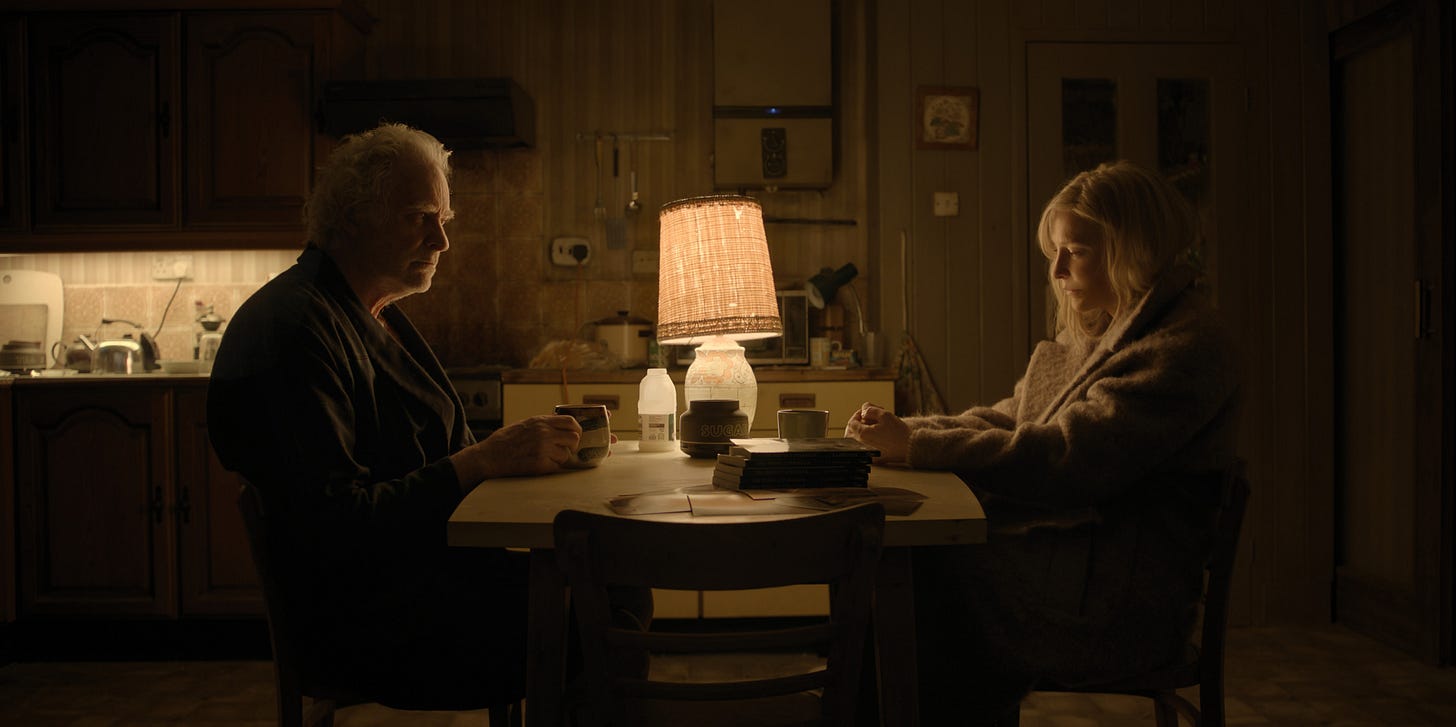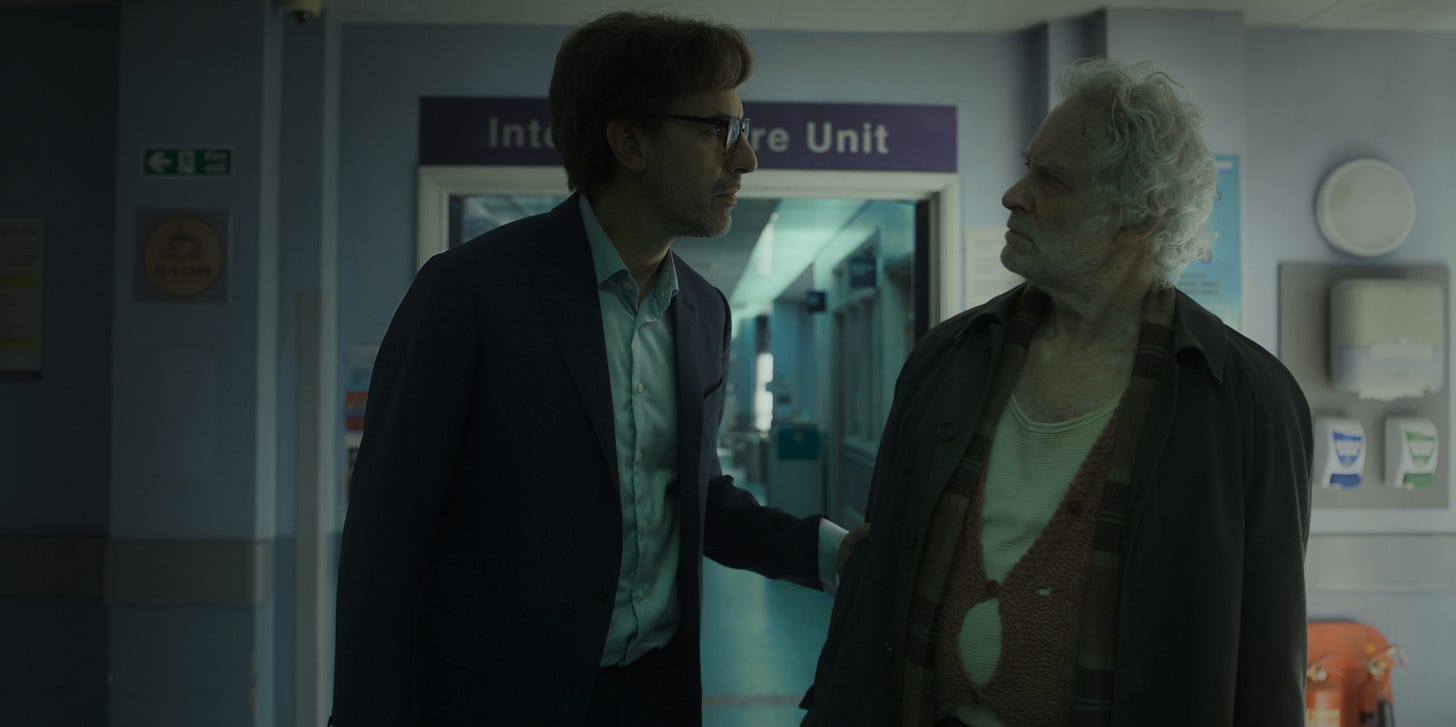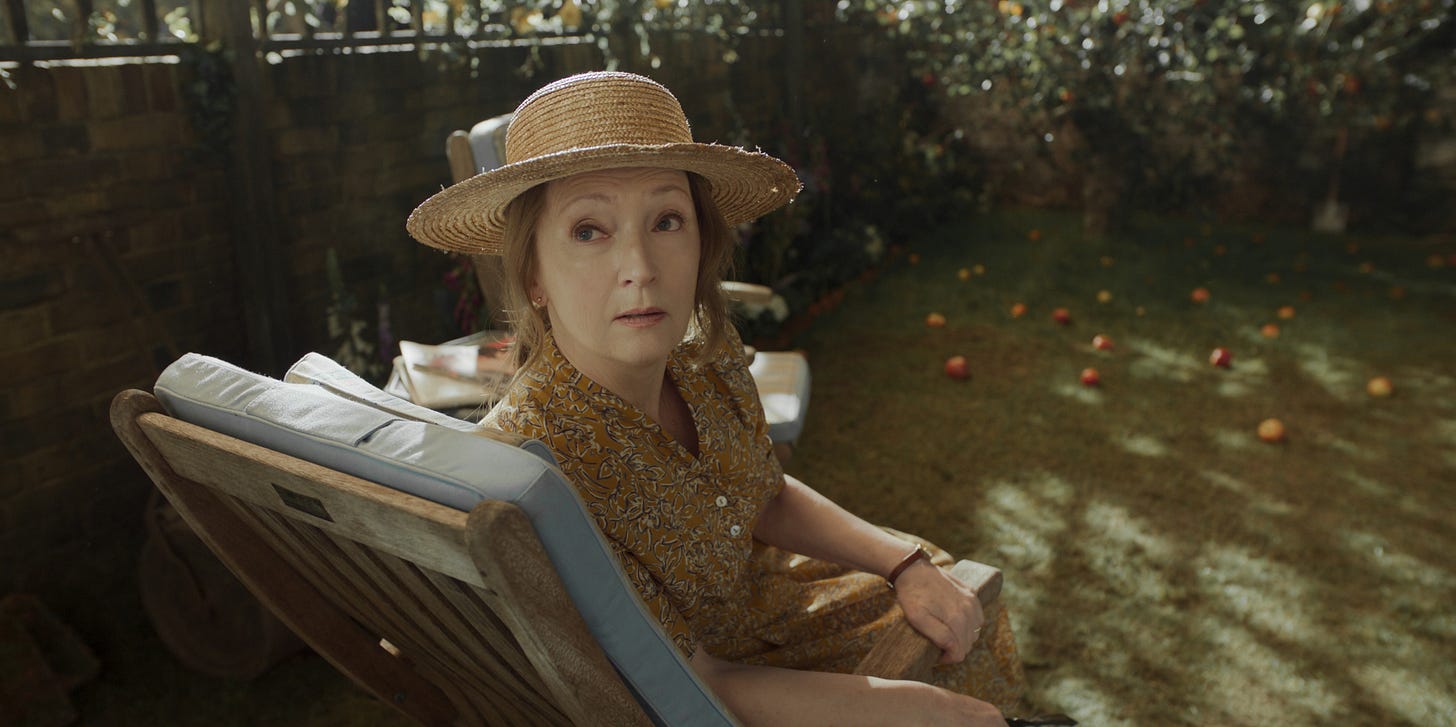What Silence Leaves Behind
On Apple TV+’s "Disclaimer" and what we inherit when we accept the easiest version of the truth.
I started watching Disclaimer because Cate Blanchett got an Emmy nomination. I love her work, hadn’t realized Alfonso Cuarón was directing, and figured it was worth exploring with my new Apple TV+ subscription.1 I never read Renée Knight’s novel. I avoid reading anything about shows beforehand. I want my first impression to be mine.
What I didn't expect was how the show would force me to confront my own assumptions about whose stories I'm predisposed to believe.
By episode two, I was piecing things together: the disheveled old man was the dead boy's father, the successful journalist was the young woman from the photographs. It felt elegant. A story about consequences catching up.
By episode five, I was giddy. Cuarón had crafted what felt like a flawlessly executed revenge plot, and I was here for every delicious moment. As someone who believes removing access to me is the best revenge and moving on, I thoroughly enjoy watching it happen in TV and movies. It reminded me of that ABC show Revenge from years ago, which had me in a chokehold for this exact reason.2 So seeing Catherine Ravenscroft get systematically destroyed by Stephen Brigstocke felt like justice.
The book accused her of seducing Stephen's son on a college gap year trip in Italy, using him, then letting him drown while trying to save her own child. Copies started appearing everywhere—sent to her home, her husband's newsroom, her workplace, even shelved at her favorite bookshop. She deserved this reckoning.
Stephen had found the manuscript locked away in a drawer years after his wife Nancy died, then decided to self-publish it under a pseudonym and execute his revenge plan. But even early on, something didn't sit right. Not about Catherine's supposed guilt, but about how quickly everyone turned on her. Her colleagues at the documentary studio (people trained to vet sources and question narratives) instantly believed a self-published book by an anonymous author. As someone with a journalism background, I found that deeply unrealistic.
But Stephen was clever to bet on that. He figured her coworkers were probably jealous and would seize any excuse to cut her down. He was right.
One especially jealous colleague grabbed Catherine's arm when he confronted her at work. When she slapped him and told him to get his hands off her, people were already recording. The video went viral, showing only the slap, not the aggression that preceded it. He sat there playing the victim. I would've slapped him too.
When Robert got the photographs delivered to his office and his rage and shock cracked through the surface, I understood. When her son Nick rejected her, it felt like natural consequences.
That satisfaction I felt was exactly what Cuarón was counting on. Disclaimer is built like a house of mirrors. Each reflection just distorted enough to feel real. But what he did was more than withhold information. He makes us complicit.
For six hours, I watched Catherine's life disintegrate through a version of events shaped by grief, denial, and photographs of a younger Catherine—half-clothed, touching herself, staring blankly into the camera. Images that looked, at first glance, like seduction. I accepted that version because revenge stories scratch an itch. They're clean and conclusive in ways real life rarely is.
But by episode six, something shifted. I realized we'd been watching Catherine's life unravel through the lens of a story written by someone who wasn't there. Through Nancy Brigstocke's imagination. And we hadn't heard a single word from Catherine herself.
When she finally tells her story in Stephen's dimly lit kitchen in episode seven, my heart sank. The truth demolished everything Stephen had refused to see about his son.

But Stephen didn't believe her. Or maybe he couldn't. What caught me off guard wasn’t just that he didn’t want to believe her — it was that this wasn’t even his first attempt. He had already tried to kill Nick at the hospital, and Catherine stopped him. And somehow, Robert still took his side. Welcomed him back like nothing happened. Then, after Catherine finally told him the truth Stephen still got up after watching her sip on tea he had laced with crushed sleeping pills, and decided to go try again. That’s when I had to tap out. Sir, be serious. You’re not grieving anymore. You’re just dangerous. That was the moment I stopped feeling satisfied and started feeling sick.
He hadn't just been trying to destroy her life. He wanted her to feel what he and Nancy had felt. Grief so sharp it rearranged their reality. And he was going to get there by taking her son.
But when he arrived, Nick, barely conscious and still recovering from his overdose, looked up at Stephen and mistook him for his mother. "Mum?" he whispered. "I want to go home."
Stephen, who had spent years obsessed with blame, finally saw what he had refused to acknowledge: Nick wasn't part of this. He couldn't go through with it. Stephen finally decides to tell Robert the truth—about Catherine’s rape, the photographs, the story that his wife had made up.
Outside, as Stephen waited for the elevator, Robert confronted him.
"Didn't you know what your son was?" he asked. "How couldn't you know? Why didn't you question it?"
Stephen turned the mirror back: "No, Mr. Ravenscroft. Why didn't you?"
The elevator doors closed on that question. It was a really powerful moment in the series and I realized what both fathers had missed—and what I had missed too.

Nick's addiction and his recent job loss were consequences of witnessing something traumatic he'd buried so deeply he couldn't recall it. Jonathan had likely assaulted his previous girlfriend Sasha. That explained why she left Italy abruptly, why her mother Emma was so furious, why they vanished after being told Jonathan had died.
I initially took the opening train scene at face value. It was framed as a flashback, but I didn't yet understand that it came from Nancy's mind. Her version, where Sasha was promiscuous and Jonathan was an innocent boy in love. But by the end, I saw it clearly: she was rewriting assault as seduction to make her son a hero, not a predator.
Nick had witnessed his mother being assaulted. He buried it, and the silence buried them both in different ways. Catherine's original trauma had shaped her family for decades. The way she related to her son, the distance she maintained, the weight she carried alone. Everything about their relationship—the tension, the careful distance—suddenly made sense.
Catherine said Nick never talked about that day again. But trauma doesn't go away. It shows up in addiction, fractured relationships, and wounds neither person knows how to name.
The silence filled the space between them. Catherine had carried that weight for decades. Her silence wasn't guilt. It was survival.
Nancy needed her son to be a victim who died saving a child. Not someone who died in the aftermath of sexual assault. Stephen needed someone to blame. Even I initially needed Catherine to be guilty, because that made the story more satisfying.
I've worked in journalism for years. I pride myself on vetting stories. But I believed Nancy's version without question because it scratched an itch. It gave me a clean villain, poetic justice, and satisfying punishment. It gave me a lie I didn't think to question.
When Catherine finally speaks in that kitchen—"Shut up, I'm talking!"—it's as much to Stephen as it is to me. I had been part of the silencing. I accepted a story that served everyone but the person who actually lived it.
Inheritance can be property and money that gets passed down through families. But it’s also about what we accept, what we carry forward, what we choose to believe.
Nick inherited trauma he couldn't name. Catherine inherited the burden of surviving assault and protecting her family through silence. Stephen inherited a manuscript filled with lies and chose to weaponize it. I inherited assumptions I was too comfortable to question.
Stephen could have asked his wife's side of the story. I could have wondered why we never heard Catherine's version. We both chose the easier path.
Disclaimer didn't just leave me wondering what happened 20 years ago in that hotel room. It left me asking what damage we allow when we fill silence with stories that make us feel better instead of facing the ones that are true. ⁂
"Disclaimer" is currently streaming on Apple TV+. All seven episodes are available now.
Shows and movies I've binged and loved recently: Your Friends & Neighbors, Murderbot, Foundation, Fountain of Youth, Loot, The Gorge, Wolfs. If you’ve seen any of these, let’s chat. ↩
Here’s four minutes of Emily Thorne and Victoria Grayson throwing shade at each other. I was fully obsessed from 2011–2015. 😂






